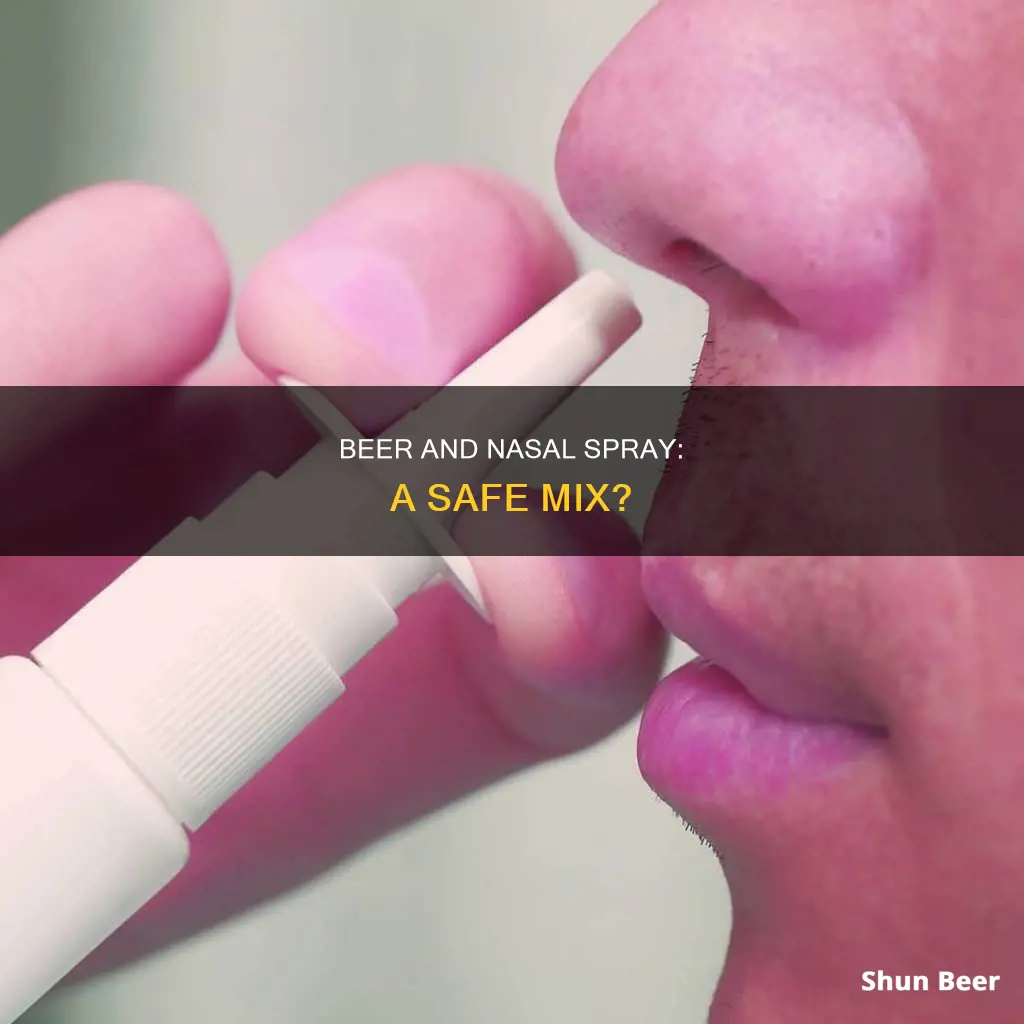
Drinking alcohol while using a nasal spray is not recommended, as it can cause side effects and reduce the effectiveness of the medication. Alcohol is known to suppress the immune system, which can make it harder to fight off infections, and histamines in certain types of alcohol may worsen congestion. Additionally, alcohol can increase the nervous system side effects of some nasal sprays, such as dizziness, drowsiness, and difficulty concentrating. While there are no known interactions between alcohol and specific nasal sprays like fluticasone, it is always advisable to consult a doctor or pharmacist before mixing alcohol with any medication to ensure safety and avoid potential health risks.
| Characteristics | Values |
|---|---|
| Can you drink beer while using nasal spray? | It depends on the type of nasal spray. For example, it is safe to drink alcohol while using fluticasone nasal spray. However, it is recommended to limit alcohol consumption when taking pseudoephedrine nasal spray. |
| Side effects of drinking alcohol while using nasal spray | Alcohol can increase the nervous system side effects of certain nasal sprays, such as dizziness, drowsiness, and difficulty concentrating. It can also impair thinking and judgment. |
| Risks of mixing alcohol and medication | Mixing alcohol with medication may carry risks and can lead to adverse side effects. It can also make the medication less effective and intensify the effects of alcohol. |
What You'll Learn

Drinking beer with azelastine nasal spray may cause dizziness and drowsiness
Azelastine nasal spray is a medication used to treat symptoms of rhinitis, such as a runny, stuffy, or itchy nose, and itchy, watery eyes caused by allergies or hay fever. It is also prescribed to relieve symptoms of non-allergic rhinitis in adults and children aged 12 and above. As an antihistamine, it works by blocking the action of histamine, a substance that causes allergic symptoms in the body.
While azelastine nasal spray is a useful treatment for allergies, it is important to be aware of its potential side effects and interactions with other substances, such as alcohol. According to the official medication guide, azelastine nasal spray may cause drowsiness. Therefore, drinking beer, or any other form of alcohol, while using this medication may increase the risk of experiencing side effects such as dizziness and drowsiness.
The National Institute on Alcohol Abuse and Alcoholism (NIAAA) states that combining alcohol with medications, including non-prescription drugs, may be harmful and lead to adverse side effects. Alcohol is a depressant, and when mixed with certain medications, it can intensify their effects, particularly drowsiness and concentration difficulties.
It is important to note that the effects of mixing azelastine nasal spray and beer may vary from person to person. However, to stay on the safe side, it is advisable to avoid or limit alcohol consumption while using this medication. If you are unsure about the safety of drinking beer with azelastine nasal spray, it is always best to consult your doctor or pharmacist for personalized advice.
Additionally, it is worth mentioning that nasal congestion and sinus headaches after drinking beer could be related to other factors, such as developing an allergy or intolerance to certain ingredients in beer, dehydration, or changes in immune function. If you are experiencing these symptoms, consulting a healthcare professional is recommended to identify the underlying cause and determine the most appropriate course of action.
Mixing Beer and Adderall: What You Need to Know
You may want to see also

Beer may be causing your nasal congestion
Nasal congestion after drinking beer could be caused by a variety of factors, some more serious than others. Here are some possible reasons why you might be experiencing this issue:
Alcohol Intolerance or Allergy
An alcohol intolerance is often mistaken for an alcohol allergy and is commonly associated with an ALDH2 deficiency. This means your body struggles to remove acetaldehyde, a byproduct of alcohol metabolism, from your system. As a result, you may experience congestion, flushing, headaches, and other unpleasant symptoms. It's important to note that alcohol intolerance and allergy are separate conditions, and the treatment recommendations for each will differ.
Histamines in Alcoholic Beverages
Many alcoholic drinks, including beer, contain histamines, which can trigger allergy-like reactions in some individuals. Histamines are chemicals produced by the body during an allergic reaction, causing symptoms such as itching, flushing, and congestion. If you are sensitive to histamines, drinking beer or other alcoholic beverages with high histamine levels could lead to nasal congestion.
Gluten or Other Proteins in Beer
If you have an intolerance or sensitivity to gluten, wheat, or other proteins found in beer, this could be the source of your nasal congestion. Even if you don't have celiac disease or a diagnosed wheat allergy, you may still experience symptoms such as congestion and a runny nose after consuming beer.
Sulfites in Alcohol
Sulfites are preservatives commonly found in alcoholic beverages, particularly wine. Some people are sensitive or intolerant to sulfites, which can result in adverse reactions, including nasal congestion, when consuming alcohol.
Dehydration
As you age, your body becomes more prone to dehydration, which can lead to chapped lips and other issues. Dehydration can also contribute to nasal congestion. If you haven't been staying properly hydrated, this could be a factor in your congestion after drinking beer.
Other Factors
In some cases, the cause of nasal congestion after drinking beer may be multifactorial. For example, alcohol can suppress your immune system, making you more susceptible to allergy attacks. Additionally, your food sensitivities can change over time, and consuming something you are sensitive to repeatedly can worsen your reaction.
If you are concerned about your nasal congestion after drinking beer, it is always best to consult with a healthcare professional. They can help you identify the specific cause and provide personalized advice or treatment options.
Beer After Work: Relax, Unwind, and Socialize
You may want to see also

Beer and pseudoephedrine nasal spray can be a risky combination
Beer and Pseudoephedrine Nasal Spray: A Risky Combination
Pseudoephedrine is a non-prescription medication used to relieve blocked noses. It is a nasal decongestant that comes in tablet or liquid form. It is often used to treat conditions such as the common cold. It is important to note that pseudoephedrine is different from phenylephrine, which is an over-the-counter medication with similar brand names.
Alcohol Interaction with Pseudoephedrine
While it is not strictly prohibited to consume alcohol while taking pseudoephedrine, it is recommended to limit alcohol intake. Alcohol can interact with pseudoephedrine and other medications, potentially leading to adverse side effects. According to the National Institute on Alcohol Abuse and Alcoholism (NIAAA), combining alcohol with medications, including non-prescription ones, may be harmful.
Risks and Side Effects
A 2018 study found that mixing medications with alcohol can result in negative side effects, which may be more pronounced in older individuals. Additionally, a 2015 study suggested that mixing alcohol and medications is a common practice in the United States, posing potential health risks.
When pseudoephedrine and alcohol are combined, the side effects can be unpredictable and related to dosage. The NIAAA warns that combining alcohol with certain medications may lead to loss of coordination and, in extreme cases, breathing difficulties.
Furthermore, consuming alcohol with pseudoephedrine may increase the risk of overdose and can intensify the effects of alcohol, particularly drowsiness and concentration difficulties. Pseudoephedrine is a stimulant, while alcohol is a depressant, and their interaction can be complex.
Other Interactions with Pseudoephedrine
Pseudoephedrine may also negatively interact with other medications, including monoamine oxidase inhibitors (MAOIs), tricyclic antidepressants, digoxin, and ergot alkaloids. It is crucial to consult a pharmacist or doctor before taking pseudoephedrine with any other medications, including prescription, non-prescription, herbal remedies, vitamins, or supplements.
Fluticasone Nasal Spray and Alcohol
On the other hand, fluticasone nasal spray, a corticosteroid medicine used to treat allergic rhinitis and hay fever, does not have any known interactions with alcohol. However, it is always advisable to follow the instructions provided with your medication and consult a healthcare professional if you have any concerns.
Drinking Beer Legally in Dry Counties: What's Allowed?
You may want to see also

Alcohol may reduce the effectiveness of a nasal spray
While it is possible to drink alcohol while using nasal spray, it is important to understand the risks and side effects that may occur when mixing the two. Alcohol may reduce the effectiveness of a nasal spray, and it is recommended to limit alcohol consumption when using certain nasal sprays.
Azelastine nasal spray, for example, can have its side effects intensified when mixed with alcohol. These side effects include dizziness, drowsiness, and difficulty concentrating. In some cases, alcohol can lead to impaired thinking and judgment, so it is advised to avoid activities requiring mental alertness, such as driving or operating machinery, until you know how the medication affects you.
Pseudoephedrine, a common nasal decongestant, can also be affected by alcohol. Although it is a non-prescription medication, limiting alcohol intake is recommended. Pseudoephedrine is a stimulant, while alcohol is a depressant, and combining the two can lead to unpredictable side effects. The National Institute on Alcohol Abuse and Alcoholism (NIAAA) warns that mixing alcohol with certain medications can result in adverse effects such as loss of coordination and, in extreme cases, breathing difficulties.
Additionally, alcohol can weaken the immune system, making it harder to fight off infections and allergies. This can be counterproductive when using a nasal spray to relieve congestion or allergy symptoms. A small study showed that alcohol can make decongestants less effective in people with seasonal allergies.
It is always advisable to consult a doctor or pharmacist before mixing alcohol with any medication, including nasal sprays. They can provide guidance on potential interactions, side effects, and recommended dosages to ensure safe and effective use.
California Beach Beer Drinking: What's Allowed?
You may want to see also

Fluticasone nasal spray and beer are safe to consume together
Fluticasone nasal spray is a corticosteroid medication that helps to treat allergy symptoms such as sneezing, itching, and a runny or stuffy nose. It is safe to consume alcohol while using this medication, as it will not negatively impact its effectiveness. However, it is important to note that alcohol may worsen allergy symptoms, especially if you are allergic to any of the ingredients in beer.
Fluticasone nasal spray is designed to reduce inflammation in the nose, making it easier to breathe. It is available as a prescription or over-the-counter medication and is typically sprayed into each nostril once or twice a day. The spray starts to work within 12 hours, but it may take a few days to feel the full benefit. It is important to follow the directions on the package or those provided by your doctor or pharmacist.
Although drinking beer while using fluticasone nasal spray is generally safe, it is always advisable to consult with your doctor or pharmacist before mixing any medication with alcohol. Additionally, it is important to be cautious if you are taking other medications or have any medical conditions, as these may interact with either the fluticasone or the alcohol.
It is worth noting that while fluticasone nasal spray is generally safe for long-term use, children and teenagers may need to have their height and weight monitored if using high doses for an extended period. This is to ensure that the steroid does not negatively impact their growth.
Beer Tube Screens: How Do They Work?
You may want to see also
Frequently asked questions
It depends on the type of nasal spray. Fluticasone nasal spray, for instance, can be used alongside alcohol. However, other nasal sprays, such as Azelastine, may have adverse effects when mixed with alcohol. It is always best to consult a doctor or pharmacist.
Alcohol can weaken your immune system, making it harder to fight off infections. It can also amplify the stimulating effects of decongestants, resulting in irregular heartbeats and high blood pressure. Additionally, alcohol can increase the nervous system side effects of certain nasal sprays, such as dizziness, drowsiness, and difficulty concentrating.
Yes, it is generally recommended to avoid alcohol while using decongestants. Water or other non-alcoholic beverages are always a good alternative to beer.







